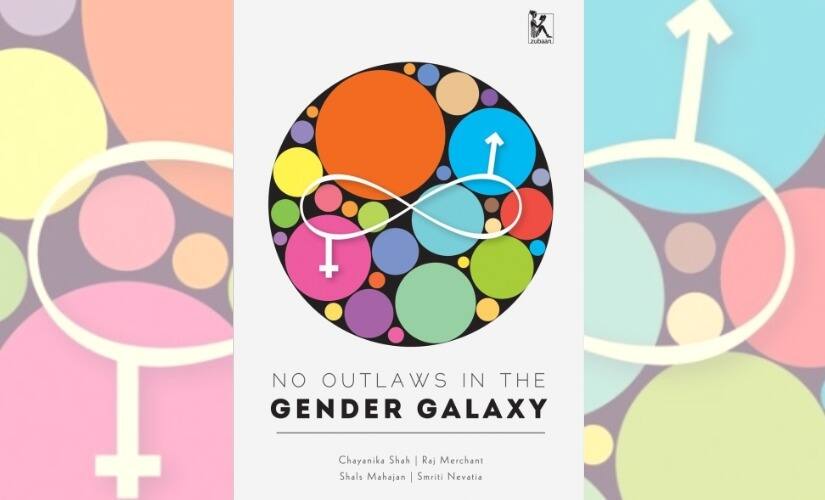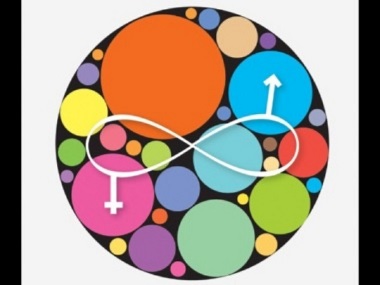The Queer Bookshelf is your fortnightly date with books about queer lives and loves from India and elsewhere *** How many genders do you think there are? I genuinely want to know. My teachers at school used to believe that there are only two. They did not say so in explicit terms but my child-mind inferred this from English language exercises that used a binary classification system for various species of living beings: horse/mare, goose/gander, lion/lioness, deer/doe, bull/cow, peacock/peahen, tiger/tigress. And, of course, man/woman. Our job as students was to memorise and recall this ‘knowledge’, not set off on journeys of enquiry and exploration. As an adult who is privileged enough to access vocabulary that is common currency in activist and academic spaces, I am now aware of identities such as cisgender, transgender, genderfluid, genderqueer, agender, non-binary, and gender non-conforming. I hesitate to include the term ‘third gender’ because it sounds more like a lowly position in a hierarchy of genders than a term chosen by people to define who they are. I dream of a world where everyone is free to identify and express their gender, and is considered worthy of respect. A pecking order has no place in that vision. The opening question of this column comes from a book I have been reading. Titled No Outlaws in the Gender Galaxy, it has been collaboratively written by Chayanika Shah, Raj Merchant, Shals Mahajan and Smriti Nevatia, and published by Zubaan Books in 2015. The question was part of an interview guide they prepared while working on a study about the lived experience of 50 persons assigned gender female at birth (PAGFB). The study was led by a team of 11 researchers from a feminist lesbian, bisexual and trans collective called LABIA that is based in Mumbai but is actively engaged with women’s movements and queer organising across India. They used their networks to reach out to respondents in Mumbai, Kolkata, Thrissur, Bangalore, Chennai, Vadodara, Pune and Delhi. All the respondents identified as queer in some way. Many of them did not identify with their assigned gender in a binary structure reinforced by families, educational institutions, media, religion, the state, law, and the medical system. Instead of going out in search of life stories to validate their theoretical frameworks, the researchers chose to treat the respondents as experts on their lives. This helped them understand how individuals craft their gender identities in ways that are far more dynamic and personalised than one might imagine from any catalogue of gender identities that pretends to be exhaustive. [caption id=“attachment_7362661” align=“alignnone” width=“825”]  No Outlaws in the Gender Galaxy has been collaboratively written by Chayanika Shah, Raj Merchant, Shals Mahajan and Smriti Nevatia, and published by Zubaan Books in 2015[/caption] The authors say, “Such a process of naming and of arriving at a language that helps people speak of their lives so as to resist the terms dictated by the binary makes it clear that gender identities make sense only when these are self-chosen and self-assigned. To be assigned such a personal identity at birth by someone else, long before one has had the chance to discover or understand anything about oneself, is therefore patently absurd.” Those who are impatient with diversity might dismiss the emphasis on self-determination as the work of people who need to get a life, but naming is important to individuals who have been made invisible. Through the resources of language, they write themselves back into a world that has tried to steal their joy, and clip their wings. They assert their right to exist, speak and thrive. A few months ago, a friend who runs a non-profit organisation in Pune reached out for some advice on creating an application form for prospective student volunteers. He wanted to be inclusive, and his way of doing that was to provide multiple options in the section that required applicants to state their gender. He was uncomfortable with using ‘other’ as a convenient label for everyone who did not succumb to the binary, so he asked me to help expand his menu of gender identities for applicants to choose from. I appreciated his good intentions but encouraged him to drop the idea. I said, “A box is a box. You might offer five options instead of two but you are still presenting yourself as the one who gets to decide what is available and permissible. If the space is left blank, the person gets an opportunity to tell you about their relationship to gender on their own terms.” He agreed. Later, I asked him, “Why do you need to know their gender? Is it connected to the work you expect them to do as volunteers?” He replied, “I don’t know. I didn’t even think about that. All application forms ask about gender, so I did the same thing.” I am sure you will not be surprised to hear that this friend is a cisgender, heterosexual, savarna man. He is well-meaning, and wants to step outside his comfort zone. However, his privilege keeps him from seeing how marginalised bodies navigate systems that assume the gender binary to be natural, coherent, and inflexible. An innocuous-looking entry on an application form does not correspond to an act of routine self-disclosure. It demands a coming out, which is almost always a negotiated activity based on threat perception and risk assessment. The risks are higher for people who belong to communities that have been historically oppressed on account of race, caste, ethnicity and religion. The authors say, “People who are seen as transgressing established gender norms face a gamut of punishments, ranging from denial of access to verbal harassment and/or physical assault.” These forms of structural violence are most evident in public places such as toilets, hospitals, shopping malls, places of worship, railway stations, airports, where gender-based segregation is enforced and normalized through the discourse of safety. “The situation of collective and individual policing of public spaces thus created relies on subjective estimations of a person’s gender that are based on how they look and act. Ironically, the burden of safety rests on the individual and their ability to pass rather than the system that is designed for their supposed safety.” This violence is also present in families, deemed to be sacrosanct but often quite damaging for the physical well-being and mental health of queer persons. For queer PAGFB, safety is not served on a platter. It has to be claimed, even fought for. Not everyone is able to access community spaces, or feel held and loved by a family of choice. The authors say, “In the cracks and spaces between school and home, and sometimes with their support, our respondents pursued many other interests and passions besides sport. Whether it was finding solace within the covers of a book or finding the writer within, in taking on different personae in theatre, picking up a camera to recreate their visions or raising their voices in song, many respondents managed to discover oases for themselves in a difficult world.” May these oases be available to all, without exception. Living is a tough job. Loving makes it easier, or at least worthwhile. Chintan Girish Modi is a writer-researcher working at the intersection of peace education, gender equality and queer rights
Privilege keeps some of us from seeing how marginalised bodies navigate systems that assume the gender binary to be natural, coherent, and inflexible.
Advertisement
End of Article


)
)
)
)
)
)
)
)
)



